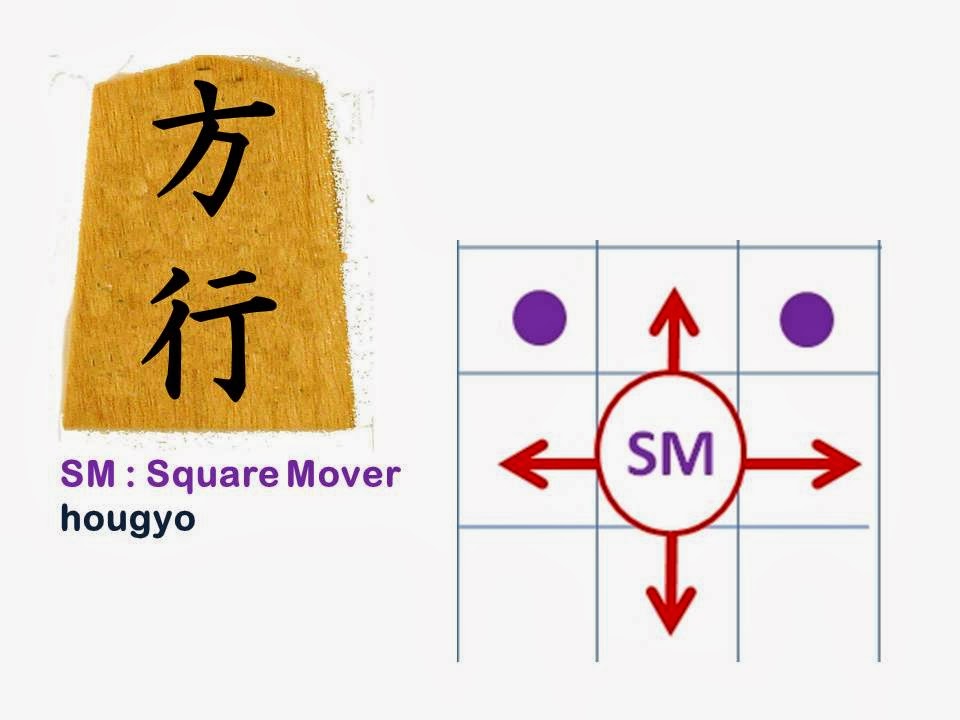row 7 : 25 Pawns
The pawn can step one square forward. An unpromoted pawn that reaches the farthest rank is trapped.
row 8 : 2 Go-BetweenThe go-between move only on square forward or backward.
Promotions
These pieces are available only after promotion:
The Buddhist Spirit may move as either a Lion or a Free King; The furious fiend can move as a lion anywhere within a two-square distance, including jumps, double capture, igui, and passing a turn; or, It can move (but not jump) up to three free squares along one of the eight diagonals and orthogonals. HOWEVER - sources describe this piece as 'lion plus lion dog'- therefore some players do just this - a similar situation to the teaching king ' free king plus lion dog. both sets of move being available - a matter of choice
The Fragrant Elephant can move any number of free squares diagonally forward; or, It can move one or two squares along one of the four orthogonal directions, or along either rear diagonal.
The Furious Fiend : this powerful piece combines the moves of the Lion and the Lion Dog. This means it has all the Lion powers of the A and B squares around itself and it can move up to 3 squares in any direction. This piece only appears after promotion.
The Great Elephant can move one to five squares orthogonally sideways or along either rear diagonal; or, It can move one to three squares diagonally forward, or directly forward or backward. HOWEVER some players keep the lion power on promotion so the extra 2 steps in the E-W-SE-SW directions are just 2 extra steps with no lion power. if the great elephant steps five steps then lion power cannot be used- once again a choice of moves is offered.
The Mountain Witch can move any number of free squares along one of the four diagonal directions, or directly backward; or, It can step one square directly forward.
The Square Mover can move any number of free squares along one of the four orthogonal directions; or, It can step one square diagonally forward.
The Teaching King can move as a lion dog (three-step lion move along any one straight line); or, It can move as a free king (range along any one straight line).
The Wizard Stork can move any number of free squares along one of the four diagonal directions, or directly forward; or It can step one square directly backward.
The Square Mover can move any number of free squares along one of the four orthogonal directions; or, It can step one square diagonally forward.
The Wizard Stork can move any number of free squares along one of the four diagonal directions, or directly forward; or It can step one square directly backward.
List of promotion
Any pieces not listed do not promote
pawn = tokin
knight = gold general
side mover = gold general
vertical mover = gold general
buddhist devil = gold general
donkey = gold general
wrestler = gold general
she-devi = gold general
guardian of the gods = gold general
kylin = great dragon
phoenix = golden bird
lion = furious fiend
chinese cock = wizard stork
old rat = wizard stork
dark spirit = buddhist spirit
deva = teaching king
flying dragon = dragon king
drunken elephant = crown prince
lion dog = great elephant
blind monkey = mountain witch
crown prince = emperor
eastern barbarian = lion
enchanted badger = dove
flying horse = free king
neighbouring king = standard bearer
northern barbarian = fragrant elephant
old kite hawk = long nosed goblin
rushing bird = free demon
southern barbarian = white elephant
water buffalo = free tapir
western barbarian = lion dog
poisonous snake = hook mover
pracing stag = square mover
There is no promotion zone in Tai shogi. Pieces promote when they capture another piece. There is no choice in this matter; the capturing piece will always promote (unless the piece cannot promote or is already promoted, of course).In this game there are no drops. Pieces that have been captured are out of the game for good. Pieces that cannot move backwards reaching the final rank stay there until captured.
If a player's last emperor or prince is in check and no legal move by that player will get it out of check, the checking move is also mate, and effectively wins the game.
Unlike Western chess, a player need not move out of check, and indeed may even move into check. Although obviously not often a good idea, a player with more than one royal (emperor or prince) may occasionally sacrifice one of these pieces as part of a gambit. A player is not allowed to give perpetual check to the sole objective piece.
Game End
A player who captures the opponent's sole remaining emperor or prince wins the game. In practice this rarely happens, as a player will resign when checkmated, as otherwise when loss is inevitable.
A player who makes an illegal move loses immediately. (This rule may be relaxed in casual games.)
Another possible, if rather uncommon, way for a game to end is repetition. If the same position occurs four times with the same player to play, then the game is no contest. Recall, however, the prohibition against perpetual check.
Pieces & Movements











